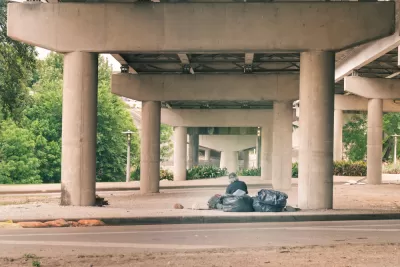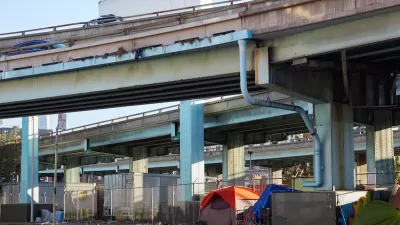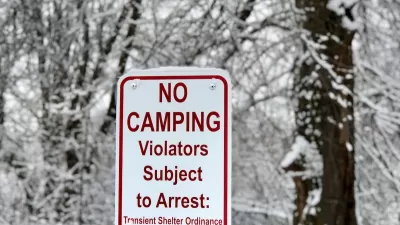Taking a comprehensive ‘Housing First’ approach, the city of Houston has cut homelessness by 63 percent in the last decade.

“During the last decade, Houston, the nation’s fourth most populous city, has moved more than 25,000 homeless people directly into apartments and houses. The overwhelming majority of them have remained housed after two years,” reports Michael Kimmelman in an expansive piece in The New York Times. “The number of people deemed homeless in the Houston region has been cut by 63 percent since 2011, according to the latest numbers from local officials.”
Houston has gotten this far by teaming with county agencies and persuading scores of local service providers, corporations and charitable nonprofits — organizations that often bicker and compete with one another — to row in unison. Together, they’ve gone all in on ‘housing first,’ a practice, supported by decades of research, that moves the most vulnerable people straight from the streets into apartments, not into shelters, and without first requiring them to wean themselves off drugs or complete a 12-step program or find God or a job.
The article details Houston’s efforts and highlights the city’s focus on eliminating “chronic homelessness,” a term referring to people who experience homelessness repeatedly or for longer than a year.
According to Kimmelman, “the big reveal after a year was not that Houston had solved the problem. It hasn’t. There is no one-time fix to homelessness.” For Kimmelman, “The reveal was something different. It was that in broken America it’s still possible for adversaries to share facts and come together around something contentious and difficult. Public and private, county and city, businesses and nonprofits, conservatives and liberals, the housed and unhoused: In Houston, enough of them have agreed on a goal that seems worth striving for.”
FULL STORY: How Houston Moved 25,000 People From the Streets Into Homes of Their Own

Alabama: Trump Terminates Settlements for Black Communities Harmed By Raw Sewage
Trump deemed the landmark civil rights agreement “illegal DEI and environmental justice policy.”

Planetizen Federal Action Tracker
A weekly monitor of how Trump’s orders and actions are impacting planners and planning in America.

The 120 Year Old Tiny Home Villages That Sheltered San Francisco’s Earthquake Refugees
More than a century ago, San Francisco mobilized to house thousands of residents displaced by the 1906 earthquake. Could their strategy offer a model for the present?

LA’s Tree Emergency Goes Beyond Vandalism
After a vandal destroyed dozens of downtown LA trees, Mayor Karen Bass vowed to replace them. Days later, she slashed the city’s tree budget.

Sacramento Leads Nation With Bus-Mounted Bike Lane Enforcement Cameras
The city is the first to use its bus-mounted traffic enforcement system to cite drivers who park or drive in bike lanes.

Seattle Voters Approve Social Housing Referendum
Voters approved a corporate tax to fund the city’s housing authority despite an opposition campaign funded by Amazon and Microsoft.
Urban Design for Planners 1: Software Tools
This six-course series explores essential urban design concepts using open source software and equips planners with the tools they need to participate fully in the urban design process.
Planning for Universal Design
Learn the tools for implementing Universal Design in planning regulations.
Ada County Highway District
Clanton & Associates, Inc.
Jessamine County Fiscal Court
Institute for Housing and Urban Development Studies (IHS)
City of Grandview
Harvard GSD Executive Education
Toledo-Lucas County Plan Commissions
Salt Lake City
NYU Wagner Graduate School of Public Service





























